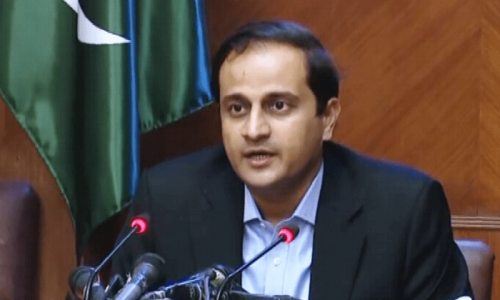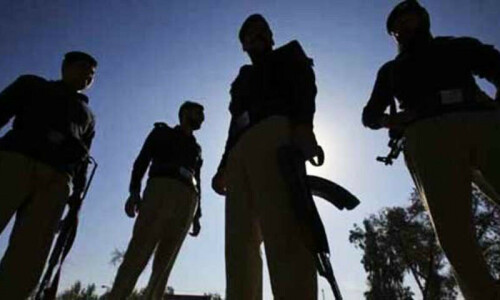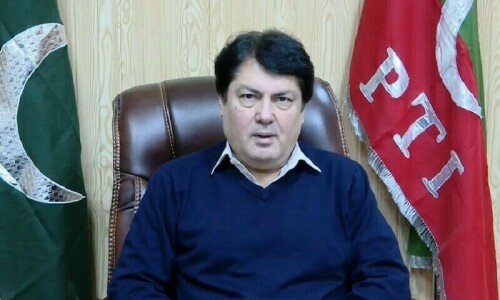HYDERABAD: Senate’s standing committee on water resources will recommend to the Council of Common Interests (CCI)-led committee on water issue to determine status of link canals branching off from the Indus and ascertain whether consent of lower riparian (Sindh) is mandatory to operate these canals, besides redefining criteria of Mangla Dam operation.
“We have recommended to the standing committee on water resources to forward the points to the CCI committee, formed by prime minister,” Senator Syed Muzaffar Hussain Shah told Dawn. “There are other points [in the set of recommendations] as well, he said.
An Umerkot-based former Sindh chief minister, Mr Shah had signed the Water Apportionment Accord of 1991 as the provincial law minister. The accord is a guiding document to regulate interprovincial water distribution but Sindh has serious reservations over its interpretation by members of the Indus River System Authority (Irsa) from Punjab.
The top water regulator, according to Sindh, allows operation of link canals — Chashma-Jhelum, Taunsa, Panjnad and Thal — unilaterally at the cost of Sindh’s water share.
Upcoming CCI meeting crucial
The prime minister had recently formed a committee, led by incumbent Attorney General Anwar Mansoor Khan, to look into water issue after the Sindh chief minister raised it in the CCI. But the terms of reference of the committee are yet to be drafted.
“AG Khan just told me on board a flight that he had not yet received any communication about the committee,” said Senator Shah. “That’s why I, as the mover and water resources committee member, have proposed that the committee should recommend the points relating to Sindh’s grievances to the CCI committee, to be headed by Mr Khan for making them part of its ToRs”, he added.
Irsa chairman Sher Zaman, who is from Balochistan, and its member from Punjab, Rao Irshad, in their very recent presentation to the Senate committee on national food security (headed by Senator Shah) and later in water resources committee reportedly contended that it was Sindh’s insistence that the link canals were flood canals and if Sindh had any such grievance it could move the CCI.
Sindh claims that during early Kharif sowing season, Mangla Dam is filled by Irsa when Sindh’s lower region needs water for sowing of summer crops which is denied. Irsa unilaterally allows operation of link canals despite Sindh’s objection. Punjab maintains that these canals are operated to draw its share of water in the Indus and divert it to the Mangla zone.
A former Sindh irrigation secretary, Idris Rajput, says that in fact, Sindh has to come up with a working paper in the CCI to prove that link canals are not operated honestly. “To me, they are neither perennial nor flood canals. If Punjab draws its share from the Indus honestly for diverting water to its areas, this can’t be opposed. We must ensure that this share is drawn as per the allocation,” said Mr Rajput. He termed these canals “need-based channels” and said they, therefore, could be operated intermittently as and when there was a need. “Sindh has the right to question Irsa’s decision in CCI.”
Senator Muzaffar Shah argues that CCI is the proper forum which had approved Water Accord so it must look into the points being raised in Senate’s standing committees. “Telemetry system at barrages to see whether flows are as per gauges remains defective. Mangla Dam should not be filled when there is a shortage in the Indus basin system. These points should necessarily be addressed by the committee headed by Mr Mansoor Khan,” he stressed.
Balochistan feels that Sindh is not judiciously sharing water with it while Sindh feels that when water flows in the Indus River system are inadequate, a shortage is bound to take place for Balochistan. It is in this backdrop that the Irsa member from Balochistan, who is currently its chairman, is taking on Sindh in the current water distribution issue.
Senator Sassui Palijo, who had also raised the point on water issue besides Senator Shah in the upper house, believes that Irsa is not a neutral body. “They [Irsa] have different interpretation of the Water Accord,” she said. She said that Irsa representatives were told that Sindh had peculiar kind of issues when it came to water distribution. “Our [Sindh’s] subsoil water is brackish. We don’t get 10MAF downstream Kotri to push back intruding Arabian Sea that is devouring our lands in the coastal districts of Badin and Thatta,” said Palijo, who hails from Thatta. “Punjab’s groundwater is sweet and they use it easily,” she noted.
She alleges that Irsa violates the accord at will.
Published in Dawn, October 16th, 2018














































